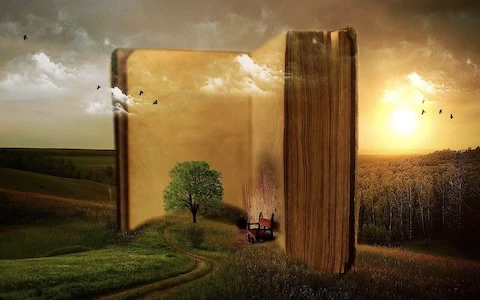Portal Fantasy Books
Explore books, themes, and recommendations in Portal Fantasy Books.

There is a real world—the world that we all know and love (or hate, as the case may be)--and a fantasy world created by our illustrious author. These two worlds are separate, but travel between them is possible. This sub-genre is part of alternate world fiction and, as the name so obviously indicates, portals into the alternate world are the primary piece of world-building.
Portal Fantasy Characteristics
- Level of Magic
Divided. Portal Fantasy is about moving from our world to another world. This other world may be highly magical, or not, but it will be different from ours in some fantastical way. Thus, part of the story is free of magic and the other part is full of it (or at least something supernatural or otherwise fantastical). In fact, Portal fantasies are often about ensuring that the worlds stay divided.
- Level of Grand Ideas and Social Implications
Moderate-High. Destiny is an idea constantly popping up in Portal Fantasies. As is self-discovery. Protagonists will undoubtably go on a journey of self-discovery, learning things about themselves they didn't think possible, accomplishing feats they felt beyond themselves.
Overall, these ideas lead to positive messages. (This positivity and penchant for lessons is perhaps why it's a popular sub-genre for children's stories.)
- Level of Characterization
High (at least for the protagonist). As the protagonist navigates the other world so too does the reader. As the protagonist learns so too does the reader. Readers will develop a deep understanding of the protagonist because they go on the same journey and are connected with the protagonists point of view. However, because readers are often so tied to the protagonist's point of view, secondary characters are not as well developed.
- Level of Plot Complexity
Moderate. Nearly all Portal fantasies are linear—that is there is a specific goal that must be achieved and all action moves toward that goal. Much of Portal Fantasy is the same: unexpectedly find a doorway to another world, go there, become a hero, and then return home.
- Level of Violence
Variable. Because Portal Fantasy is so versatile there is no set benchmark for levels of violence. However, because these stories tend to incorporate saving worlds from evil there are bound to be battle and some will be more violent and gruesome than others.
By C.S. Lewis. In the first book of this series a wardrobe serves as the portal to the magical land of Narnia.
By Lewis Carroll. You guessed it, the looking glass is a portal to an alternate world full of fantastical creatures.
- 3 Coraline
By Neil Gaiman. In this novel a young girl finds a portal to another world, pretty typical. But, the world she finds is worse than her own.
By Stephen R. Donaldson. A two-part series in which reflective surfaces serve as portals to the world of Mordant, where Terisa embarks on a quest to save the magical world.
- 5 Elidor
By Alan Garner. Four children explore a Manchester church only to be drawn into another world where they fight against evil.
By Rhiannon Lassiter. Children find their way to another world... but they don't rescue it.
By Susan Price. An aspiring poet is kidnapped for a poetry-loving dragon king. But, he's not really the hero type.
By Diana Gabaldon. Claire is on her second honeymoon in 1945 when she walks through an ancient stone circle and right into 1743. This series is part portal fantasy, part historical novel, and part romance.
By Catherynne M. Valente. A truly magical story about an ordinary young girl who is invited on an adventure to a place where her help is needed
By Joel Rosenberg. This series is about a group of college students who partake in a game of Dungeons and Dragons from time to time. On one night though, the game maker transports them into the bodies of their characters in an alternate world. The story is mostly about the students trying to get to the Gate Between Worlds in order to return home.
